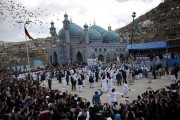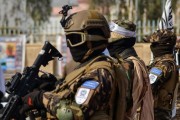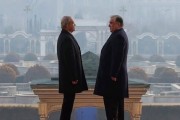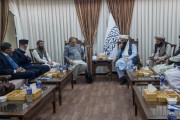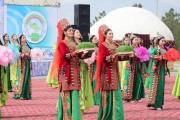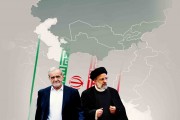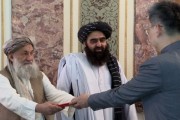Publish Date
Wednesday 30 September 2020 - 13:37
recommended
0
Why Russia has changed its policy in Afghanistan?
The Russian Federation and Afghanistan inherited an old, complex and unique relationship that has seen many ups and downs. In the recent years, especially after 2014, when the withdrawal of the US troop in Afghanistan was accelerated, Russia's strategy towards Afghanistan was changed too; an issue that needs to be examined from different aspects.
The Russian officials, who adopted a policy of cooperation with Washington against the Taliban regime in 2001, began to limit their cooperation in the middle of the first decade of the new century and explicitly expressed their opposition to the expansion of the US presence in Afghanistan. Then, they chose the strategic patience and exactly when Barack Obama started the reduction of the US troops, Russians changed their own policy towards Afghanistan.
Trump’s victory in 2016 was coincided with implementation of Russia’s new strategy. This strategy largely reflects Moscow’s alignment with the US policy in Afghanistan. The climax of this alignment can be seen in Russia's approach towards the Afghan peace talks, something that is difficult to understand in the context of Russia’s regional policies.
By: Mohammad Taghi Jahanbakhsh
Introduction
The Russian Federation and Afghanistan inherited an old, complex and unique relationship that has seen many ups and downs. In the recent years, especially after 2014, when the withdrawal of the US troop in Afghanistan was accelerated, Russia's strategy towards Afghanistan was changed too; an issue that needs to be examined from different aspects.
The Russian officials, who adopted a policy of cooperation with Washington against the Taliban regime in 2001, began to limit their cooperation in the middle of the first decade of the new century and explicitly expressed their opposition to the expansion of the US presence in Afghanistan. Then, they chose the strategic patience and exactly when Barack Obama started the reduction of the US troops, Russians changed their own policy towards Afghanistan.
Trump’s victory in 2016 was coincided with implementation of Russia’s new strategy. This strategy largely reflects Moscow’s alignment with the US policy in Afghanistan. The climax of this alignment can be seen in Russia's approach towards the Afghan peace talks, something that is difficult to understand in the context of Russia’s regional policies.
The fundamental question that will be addressed in this essay is how the Russian's policy towards Afghanistan can be analyzed. In order to answer this question, besides investigating the evolution of the foreign policy of the Soviet Union and the Russian Federation, Russia's possible goals and interests in pursuing the current policy will also be discussed.
The evolution of the Russian-Afghan relations
The history of political relations between Russia and different Afghan governments backs to many years ago. However, in the past one hundred years, their relations have seen many important turning points, including the invasion of the Soviet Union to Afghanistan. Prior to the invasion, Afghans knew Russia as a superpower with a constructive approach. The development projects that were carried out by the Soviet Union and its satellite countries in Afghanistan were not comparable to those of any other country. But as much as these measures left a positive image of Russia in the minds of the Afghans, Moscow’s aggression and the emergence of left-wing governments in this country was catastrophic for the afghan people. Many Afghan experts still attribute all the miseries of their county to that military invasion; an idea that may not be far from reality.
In general, Russia's policy towards Afghanistan since its invasion to the country can be classified into four periods:
Introduction
The Russian Federation and Afghanistan inherited an old, complex and unique relationship that has seen many ups and downs. In the recent years, especially after 2014, when the withdrawal of the US troop in Afghanistan was accelerated, Russia's strategy towards Afghanistan was changed too; an issue that needs to be examined from different aspects.
The Russian officials, who adopted a policy of cooperation with Washington against the Taliban regime in 2001, began to limit their cooperation in the middle of the first decade of the new century and explicitly expressed their opposition to the expansion of the US presence in Afghanistan. Then, they chose the strategic patience and exactly when Barack Obama started the reduction of the US troops, Russians changed their own policy towards Afghanistan.
Trump’s victory in 2016 was coincided with implementation of Russia’s new strategy. This strategy largely reflects Moscow’s alignment with the US policy in Afghanistan. The climax of this alignment can be seen in Russia's approach towards the Afghan peace talks, something that is difficult to understand in the context of Russia’s regional policies.
The fundamental question that will be addressed in this essay is how the Russian's policy towards Afghanistan can be analyzed. In order to answer this question, besides investigating the evolution of the foreign policy of the Soviet Union and the Russian Federation, Russia's possible goals and interests in pursuing the current policy will also be discussed.
The evolution of the Russian-Afghan relations
The history of political relations between Russia and different Afghan governments backs to many years ago. However, in the past one hundred years, their relations have seen many important turning points, including the invasion of the Soviet Union to Afghanistan. Prior to the invasion, Afghans knew Russia as a superpower with a constructive approach. The development projects that were carried out by the Soviet Union and its satellite countries in Afghanistan were not comparable to those of any other country. But as much as these measures left a positive image of Russia in the minds of the Afghans, Moscow’s aggression and the emergence of left-wing governments in this country was catastrophic for the afghan people. Many Afghan experts still attribute all the miseries of their county to that military invasion; an idea that may not be far from reality.
In general, Russia's policy towards Afghanistan since its invasion to the country can be classified into four periods:
The first period: from invasion to Afghanistan to the collapse of the Soviet Union (1979-1991).
With the Soviet invasion of Afghanistan, the cells of Islamic resistance against the occupation of the Soviet Union were formed and the United States, as another pole of the then international system, rushed to help the Afghan Mujahedin along with Saudi Arabia and Pakistan. Although the resistance of the jihadist groups finally led to the withdrawal of the Soviet Union from Afghanistan, its puppet government was still in office, which meant that the Mujahedin‘s mission was unaccomplished. With the collapse of the Soviet Union and the fall of Najib’s government, the Islamic government of Afghanistan was formed and the Mujahedin came to power.
Russia's military presence in Afghanistan lasted until 1989. During these years, the Soviet Union was the absolute power of the country. So, it is difficult to talk about a political relationship between the two countries, because the Soviet Union was actually the ruler of Afghanistan. It was only after the withdrawal of the Soviet Union that a so-called political relationship between the two countries emerged. During this period and until the collapse of the Soviet Union, the Russians continued their political support of Najib’s government.
The second period: from the Soviet Union’s collapse to the US occupation of Afghanistan (1991-2001).
Withdrawal from Afghanistan marked the beginning of the collapse of the Soviet Union’s grandeur. The economic problems caused by the staggering costs of Soviet military presence and political intervention in various countries became more obvious after the withdrawal of the Red Army from Afghanistan. These problems finally led to the collapse of the Soviet Union and the subsequent internal problems of the republics prevented Moscow from focusing on Afghanistan. In fact, the Russians showed no interest in Afghanistan during this period. Experts refer to this condition as the "Afghan syndrome."
Russia saw the signs of Afghanistan’s influence in Tajikistan's civil war in the mid-1990s and also in Chechnya later that decade. However, it preferred to follow the issue in those countries rather than in Afghanistan. The Twin Towers attacks in New York showed that the scale of terrorism coming from Afghanistan is unstoppable. That was why the Russians sympathized with the US authorities after 9/11 and tried to help them in their invasion to Afghanistan.
The third period: from occupation of Afghanistan to Trump’s presidency (2001-2016).
The occupation of Afghanistan led to the escape of the Islamist militants who had turned Afghanistan into a safe haven for their activities. After the formation of a new government in Afghanistan, the United States and NATO increased their military presence in that country. This made Moscow to gradually limit its cooperation with Washington, and, from 2006 onwards, explicitly oppose the presence of the US and the western forces in Afghanistan. This approach, however, remained a mere political strategy and never went beyond some comments during the press interviews. Perhaps the reason for this behavior was Moscow’s involvement in a series of the regional conflicts, such as in Georgia, Ukraine and Syria. So, it was natural for this country to be reluctant to open new political and security fronts in such situations.
Obama's timetable for withdrawal created a power vacuum in Afghanistan that was quickly identified and filled by the Taliban. The expansion of the Taliban’s territory mainly happened during this period, especially between 2014 and 2016. In the last years of this period, the signs of Russia's connection with the Taliban emerged. Moscow also began to play a more active role in Afghanistan's political arena.
The third period: from occupation of Afghanistan to Trump’s presidency (2001-2016).
The occupation of Afghanistan led to the escape of the Islamist militants who had turned Afghanistan into a safe haven for their activities. After the formation of a new government in Afghanistan, the United States and NATO increased their military presence in that country. This made Moscow to gradually limit its cooperation with Washington, and, from 2006 onwards, explicitly oppose the presence of the US and the western forces in Afghanistan. This approach, however, remained a mere political strategy and never went beyond some comments during the press interviews. Perhaps the reason for this behavior was Moscow’s involvement in a series of the regional conflicts, such as in Georgia, Ukraine and Syria. So, it was natural for this country to be reluctant to open new political and security fronts in such situations.
Obama's timetable for withdrawal created a power vacuum in Afghanistan that was quickly identified and filled by the Taliban. The expansion of the Taliban’s territory mainly happened during this period, especially between 2014 and 2016. In the last years of this period, the signs of Russia's connection with the Taliban emerged. Moscow also began to play a more active role in Afghanistan's political arena.
The fourth period: From Trump's presidency to present (2016- present).
A few months after Donald Trump took the office, he announced his strategy towards Afghanistan and South Asia in August 2017. In this strategy, which had major changes compared to Obama's strategy, the US pledged to block the rise of the Taliban and destroy the ISIS and al-Qaeda. While this change contradicted the original US strategy of invading Afghanistan, it was predictable that it would pave the way for peace talks with the Taliban.
About a year later, the US-Taliban talks began under the leadership of Zalmay Khalilzad and have continued to this day. In the midst of this process, the Russians, along with the United States and China, reached a kind of international consensus over a peace roadmap in Afghanistan through a tripartite mechanism, and since then we are witnessing Russia's full cooperation with the United States.
Russia’s aspiration for revival of the past glory
The developments of Russia’s foreign policy would raise the question that why Moscow has taken an active role in Afghanistan. To answer this question, we must review the story from the days after the collapse of the Soviet Union.
In the 1990s, Russia was severely affected by economic, political, and security problems. Therefore, by adopting a defensive policy, Russia declared Near Abroad as the main sphere of its political maneuvers. With the passage of time and crossing internal crises, Russia managed to take advantage of the economic opportunities arising from a spike in energy prices to establish the regional mechanisms needed to consolidate its influence in Near Abroad and establish its role as a regional power. Georgia’s crisis in 2008 was the culmination of this consolidation.
After that, by expanding its own sphere of influence, Russia showed that it is looking for something beyond becoming the dominant power of Eurasia. Perhaps the signing of the New Start Treaty with the United States could be seen as the starting point for the Russians' new approach. After that, the Russians began to play a role in the crises of Ukraine, Syria, Afghanistan, Yemen, Libya, and most recently Venezuela. In fact, in the new era, Moscow tried to play a prominent role in management of the international crises, which is one of the attributes of a superpower.
Regardless of whether Russia is able to revive its superpower position, and whether the international system is moving towards polarization or not, there are several indications that shows Russia's role in the international system is evolving. In my opinion, playing an active role in Afghanistan also must be analyzed in the same context.
Russia's goals of cooperating with the US in Afghanistan
Although Russia and the United States have serious differences on various international issues, including the Syrian crisis, the political crisis in Venezuela, the annexation of Crimea, and the developments of Libya, it seems that Afghanistan has provided a suitable ground for a rapprochement between the two countries.
The United States and Russia have both been affected by Afghanistan’s terrorism. The 9/11 attacks, the Tajik civil war, the Chechen conflict, and other insecurities in Russia and the Central Asian countries are the examples of this claim. In addition, both countries are highly sensitive to the rise of the Islamist groups, despite their differences over the examples of these groups. In other words, the United States and Russia both agree that peace in Afghanistan is in their best interests. Peace in Afghanistan paves the way for a dignified withdrawal of the US forces and also reassures Russia about the security of its own land as well as its allies’.
Moscow is looking for a safe, predictable, stable and geopolitically neutral Kabul. The best-case scenario for the Russians would be the presence of a government which is completely able to exercise sovereignty over the entire territory of Afghanistan and prevent the growth of the terrorist groups. Washington does not seem to be opposed to such a scenario. So, it is natural that the type of government and constitution in Afghanistan have a lower priority from the US and Russia’s point of view. That is why the US and Russia do not care about the preservation of the Afghan constitution - which is the result of the 2001 Bonn Conference - and have defined peace in Afghanistan as their main goal.
Meanwhile, the Russians have several goals and interests that the new approach can help achieve them. Three main triple goals that Russia is pursuing in political, security and economic areas are as follow:
Political trilogy
First, the first goal of Russia’s new policy is to maintain, strengthen and consolidate Moscow’s influence in Central Asia. In the recent years, Russia has revived its regional status through numerous political, security, and economic ties with Near Abroad countries, especially in the Central Asia. However, Afghanistan, due to its long borders with Uzbekistan, Tajikistan and Turkmenistan, would be a good platform for that purpose. In addition, in the north of Afghanistan, there is the ethnic extension of its neighbors which have many interactions on both sides of the border.
Second, by strengthening their ties with Afghanistan's current and future actors, the Russian will have the opportunity to obtain a good position in Afghanistan's future, if any of the existing scenarios - continuation of the status quo or the rise of the Taliban - comes true. Moreover, Russia has lost many of its friends following its withdrawal from Afghanistan. Cooperation with the United States will largely prevent any sensitivity in the US and NATO about the political relations of Russia and the Afghan forces. Through these connections, the Russians hope to gain a foothold among Afghanistan's younger generation in order to be able to play a more important role in the country’s future.
Third, one of the most important challenges of Russia's foreign policy is Ukraine's crisis. It is possible that in a political trade off, Russia accompany the United States in the Afghan peace process and in return receive a concession to resolve the "frozen crisis" of Ukraine. By such a deal, both sides of the game will benefit: Trump can solve the long-standing problem of the US military presence in Afghanistan and sell this winning card to its own people, and Russia - among other benefits of the peace - can receive a significant political concession.
Security trilogy
First, the first security goal of the Russia’s new policy is to provide an environment in which the conflict between the Afghan government and the Taliban ends and a government come to power that can easily counter the local and international terrorist groups, particularly the ISIS. Given that many members of the ISIS in Iraq and Syria are Muslims from the Central Asia and Caucasus, Russia is concerned that if these ISIS members left unchecked in Afghanistan, they can use the country’s social, geographical and logistical resources to establish territory and attack the interests of Russia and its allies.
In addition, Afghanistan has a long border with Central Asia countries which are in the process of visa-free travel with Russia. The arrival of these people to Afghanistan's neighbors and from there to Russia could pose serious security risks for Russia. Also, ISIS in Iraq and Syria that has suffered deep wounds from Iran and the Russia may seeks to compensate. So in the current environment which is conducive to the continuation of ISIL activities, the possibility of terrorist threats against Russia will be more than ever.
Second, according to the international reports, there are at least twenty terrorist groups operating in and around Afghanistan at the moment, including the ISIS and al-Qaeda. Undoubtedly, a real peace and presence of a powerful government in Afghanistan will provide an environment in which the Afghan government and its allies in the Shanghai Cooperation Organization and so on, can control the extremist groups with more concentration.
Third, filling the security vacuum created by the withdrawal or reduction of the US troops via institutional entities, including the Shanghai Cooperation Organization or the Collective Security Treaty Organization, could be one of the most significant benefits of peace in Afghanistan for Russia.
Economic trilogy
First, The Russian Federation is one of the largest holders of energy resources. By exploiting the geopolitical aspects of these resources, the Russian officials have been able to tie the interests of a large part of the European and Chinese economies to their own interests. In addition to the financial gains, these ties have entangled Russia’s interests with those of other centers of political and economic power.
Moreover, regarding the growth of population and technology in Pakistan and India, there is a high need for oil and gas resources in these countries. Afghanistan, meanwhile, both plays the role of a connector and is in need of energy. There is no doubt that if peace is achieved in this country, the Russians will be able to easily export their oil and gas to Afghanistan and implement new initiatives regarding energy transfer to South Asia.
Second, The Russian goods are the great absentee of the South and West Asia markets. In the Soviet era, however, the situation was different and most of the Russian products were being sold to the neighboring countries. Increasing the export of the Russian goods in the first place requires security and stability in Afghanistan. Otherwise, the export of these goods from other routes will greatly lose its competitive advantages. Of course, it should be noted that the expansion of the market for the Russian products is not a Reasonable reason to pursue the current policy, but it can be a natural result of such an approach.
Third, Afghanistan is a vast country with rich and untapped mineral resources. Gaining access to these resources - some of which are vital, such as uranium, lithium, titanium, copper, gold, rare metals, and etc. - is attractive for many countries, including Russia. Exploration and extraction of these mines are risky at the current situation. Undoubtedly, stability in Afghanistan can pave the way for extraction of these resources.
Conclusion
Since 2011, Russia has abandoned its previous foreign policy approach and tried to emerge as a superpower, or at least a major power in the emerging international system. Moscow's efforts to participate in the management of various international crises, which is considered as one of the features of a global actor, is a clear evidence of this change.
Afghanistan, as an example of an international crisis, is also on the Russia's foreign policy agenda. Moscow have sought to play a more active role in the management of Afghanistan’s crisis over the past months. The evaluation of developments indicates that the United States and Russia have defined peace in Afghanistan as their common goal and over time, marginalized their differences in this context. Today, it is difficult to find a sign of conflict of interests between these two actors. This statement, however should not be interpreted that there will be no conflict between Washington and Moscow over Afghanistan in the future.
Trump wants to fulfill his campaign promise to withdraw the US troops from Afghanistan and end the US mission in that country. The hasty beginning of peace talks with the Taliban was exactly in line with this goal. In addition, the US president is looking for a winning card in his foreign policy to provide a package of domestic and foreign successes and sell it to the public in order to guarantee the continuation of his presidency in the second round.
Russia, which has directly witnessed the effects of an insecure Afghanistan around itself, especially in Uzbekistan, Tajikistan and Turkmenistan, and has tasted the bitter flavor of Afghanistan’s extremism in Tajikistan's civil war or in the Chechen crisis, is also seeking peace in Afghanistan. The Russians, like the Americans, want an end to the conflict between the Afghan government and the Taliban and are eager to see a government that can completely impose its sovereignty over the country. Moreover, if Moscow can play a constructive role in the Afghan crisis, it would undoubtedly be a major step towards reviving Russia's past glory. It will also have other political, security, and economic benefits for this country that would be valuable for Russia’s future and also for the future of the international system.
So, it seems that the Russians are pursuing specific goals through full compliance with the US approach in Afghanistan. The passage of time will give us a clearer picture of these goals.
Mohammad Taghi Jahanbakhsh is PhD student inInternational Relations.
Russia’s aspiration for revival of the past glory
The developments of Russia’s foreign policy would raise the question that why Moscow has taken an active role in Afghanistan. To answer this question, we must review the story from the days after the collapse of the Soviet Union.
In the 1990s, Russia was severely affected by economic, political, and security problems. Therefore, by adopting a defensive policy, Russia declared Near Abroad as the main sphere of its political maneuvers. With the passage of time and crossing internal crises, Russia managed to take advantage of the economic opportunities arising from a spike in energy prices to establish the regional mechanisms needed to consolidate its influence in Near Abroad and establish its role as a regional power. Georgia’s crisis in 2008 was the culmination of this consolidation.
After that, by expanding its own sphere of influence, Russia showed that it is looking for something beyond becoming the dominant power of Eurasia. Perhaps the signing of the New Start Treaty with the United States could be seen as the starting point for the Russians' new approach. After that, the Russians began to play a role in the crises of Ukraine, Syria, Afghanistan, Yemen, Libya, and most recently Venezuela. In fact, in the new era, Moscow tried to play a prominent role in management of the international crises, which is one of the attributes of a superpower.
Regardless of whether Russia is able to revive its superpower position, and whether the international system is moving towards polarization or not, there are several indications that shows Russia's role in the international system is evolving. In my opinion, playing an active role in Afghanistan also must be analyzed in the same context.
Russia's goals of cooperating with the US in Afghanistan
Although Russia and the United States have serious differences on various international issues, including the Syrian crisis, the political crisis in Venezuela, the annexation of Crimea, and the developments of Libya, it seems that Afghanistan has provided a suitable ground for a rapprochement between the two countries.
The United States and Russia have both been affected by Afghanistan’s terrorism. The 9/11 attacks, the Tajik civil war, the Chechen conflict, and other insecurities in Russia and the Central Asian countries are the examples of this claim. In addition, both countries are highly sensitive to the rise of the Islamist groups, despite their differences over the examples of these groups. In other words, the United States and Russia both agree that peace in Afghanistan is in their best interests. Peace in Afghanistan paves the way for a dignified withdrawal of the US forces and also reassures Russia about the security of its own land as well as its allies’.
Moscow is looking for a safe, predictable, stable and geopolitically neutral Kabul. The best-case scenario for the Russians would be the presence of a government which is completely able to exercise sovereignty over the entire territory of Afghanistan and prevent the growth of the terrorist groups. Washington does not seem to be opposed to such a scenario. So, it is natural that the type of government and constitution in Afghanistan have a lower priority from the US and Russia’s point of view. That is why the US and Russia do not care about the preservation of the Afghan constitution - which is the result of the 2001 Bonn Conference - and have defined peace in Afghanistan as their main goal.
Meanwhile, the Russians have several goals and interests that the new approach can help achieve them. Three main triple goals that Russia is pursuing in political, security and economic areas are as follow:
Political trilogy
First, the first goal of Russia’s new policy is to maintain, strengthen and consolidate Moscow’s influence in Central Asia. In the recent years, Russia has revived its regional status through numerous political, security, and economic ties with Near Abroad countries, especially in the Central Asia. However, Afghanistan, due to its long borders with Uzbekistan, Tajikistan and Turkmenistan, would be a good platform for that purpose. In addition, in the north of Afghanistan, there is the ethnic extension of its neighbors which have many interactions on both sides of the border.
Second, by strengthening their ties with Afghanistan's current and future actors, the Russian will have the opportunity to obtain a good position in Afghanistan's future, if any of the existing scenarios - continuation of the status quo or the rise of the Taliban - comes true. Moreover, Russia has lost many of its friends following its withdrawal from Afghanistan. Cooperation with the United States will largely prevent any sensitivity in the US and NATO about the political relations of Russia and the Afghan forces. Through these connections, the Russians hope to gain a foothold among Afghanistan's younger generation in order to be able to play a more important role in the country’s future.
Third, one of the most important challenges of Russia's foreign policy is Ukraine's crisis. It is possible that in a political trade off, Russia accompany the United States in the Afghan peace process and in return receive a concession to resolve the "frozen crisis" of Ukraine. By such a deal, both sides of the game will benefit: Trump can solve the long-standing problem of the US military presence in Afghanistan and sell this winning card to its own people, and Russia - among other benefits of the peace - can receive a significant political concession.
Security trilogy
First, the first security goal of the Russia’s new policy is to provide an environment in which the conflict between the Afghan government and the Taliban ends and a government come to power that can easily counter the local and international terrorist groups, particularly the ISIS. Given that many members of the ISIS in Iraq and Syria are Muslims from the Central Asia and Caucasus, Russia is concerned that if these ISIS members left unchecked in Afghanistan, they can use the country’s social, geographical and logistical resources to establish territory and attack the interests of Russia and its allies.
In addition, Afghanistan has a long border with Central Asia countries which are in the process of visa-free travel with Russia. The arrival of these people to Afghanistan's neighbors and from there to Russia could pose serious security risks for Russia. Also, ISIS in Iraq and Syria that has suffered deep wounds from Iran and the Russia may seeks to compensate. So in the current environment which is conducive to the continuation of ISIL activities, the possibility of terrorist threats against Russia will be more than ever.
Second, according to the international reports, there are at least twenty terrorist groups operating in and around Afghanistan at the moment, including the ISIS and al-Qaeda. Undoubtedly, a real peace and presence of a powerful government in Afghanistan will provide an environment in which the Afghan government and its allies in the Shanghai Cooperation Organization and so on, can control the extremist groups with more concentration.
Third, filling the security vacuum created by the withdrawal or reduction of the US troops via institutional entities, including the Shanghai Cooperation Organization or the Collective Security Treaty Organization, could be one of the most significant benefits of peace in Afghanistan for Russia.
Economic trilogy
First, The Russian Federation is one of the largest holders of energy resources. By exploiting the geopolitical aspects of these resources, the Russian officials have been able to tie the interests of a large part of the European and Chinese economies to their own interests. In addition to the financial gains, these ties have entangled Russia’s interests with those of other centers of political and economic power.
Moreover, regarding the growth of population and technology in Pakistan and India, there is a high need for oil and gas resources in these countries. Afghanistan, meanwhile, both plays the role of a connector and is in need of energy. There is no doubt that if peace is achieved in this country, the Russians will be able to easily export their oil and gas to Afghanistan and implement new initiatives regarding energy transfer to South Asia.
Second, The Russian goods are the great absentee of the South and West Asia markets. In the Soviet era, however, the situation was different and most of the Russian products were being sold to the neighboring countries. Increasing the export of the Russian goods in the first place requires security and stability in Afghanistan. Otherwise, the export of these goods from other routes will greatly lose its competitive advantages. Of course, it should be noted that the expansion of the market for the Russian products is not a Reasonable reason to pursue the current policy, but it can be a natural result of such an approach.
Third, Afghanistan is a vast country with rich and untapped mineral resources. Gaining access to these resources - some of which are vital, such as uranium, lithium, titanium, copper, gold, rare metals, and etc. - is attractive for many countries, including Russia. Exploration and extraction of these mines are risky at the current situation. Undoubtedly, stability in Afghanistan can pave the way for extraction of these resources.
Conclusion
Since 2011, Russia has abandoned its previous foreign policy approach and tried to emerge as a superpower, or at least a major power in the emerging international system. Moscow's efforts to participate in the management of various international crises, which is considered as one of the features of a global actor, is a clear evidence of this change.
Afghanistan, as an example of an international crisis, is also on the Russia's foreign policy agenda. Moscow have sought to play a more active role in the management of Afghanistan’s crisis over the past months. The evaluation of developments indicates that the United States and Russia have defined peace in Afghanistan as their common goal and over time, marginalized their differences in this context. Today, it is difficult to find a sign of conflict of interests between these two actors. This statement, however should not be interpreted that there will be no conflict between Washington and Moscow over Afghanistan in the future.
Trump wants to fulfill his campaign promise to withdraw the US troops from Afghanistan and end the US mission in that country. The hasty beginning of peace talks with the Taliban was exactly in line with this goal. In addition, the US president is looking for a winning card in his foreign policy to provide a package of domestic and foreign successes and sell it to the public in order to guarantee the continuation of his presidency in the second round.
Russia, which has directly witnessed the effects of an insecure Afghanistan around itself, especially in Uzbekistan, Tajikistan and Turkmenistan, and has tasted the bitter flavor of Afghanistan’s extremism in Tajikistan's civil war or in the Chechen crisis, is also seeking peace in Afghanistan. The Russians, like the Americans, want an end to the conflict between the Afghan government and the Taliban and are eager to see a government that can completely impose its sovereignty over the country. Moreover, if Moscow can play a constructive role in the Afghan crisis, it would undoubtedly be a major step towards reviving Russia's past glory. It will also have other political, security, and economic benefits for this country that would be valuable for Russia’s future and also for the future of the international system.
So, it seems that the Russians are pursuing specific goals through full compliance with the US approach in Afghanistan. The passage of time will give us a clearer picture of these goals.
Mohammad Taghi Jahanbakhsh is PhD student inInternational Relations.
News code:2383





